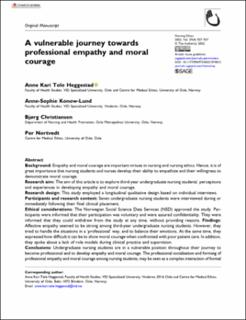| dc.contributor.author | Heggestad, Anne Kari Tolo | |
| dc.contributor.author | Konow-Lund, Anne-Sophie | |
| dc.contributor.author | Christiansen, Bjørg | |
| dc.contributor.author | Nortvedt, Per | |
| dc.date.accessioned | 2022-08-25T11:49:08Z | |
| dc.date.available | 2022-08-25T11:49:08Z | |
| dc.date.created | 2022-04-22T12:29:25Z | |
| dc.date.issued | 2022-06-01 | |
| dc.identifier.citation | Nursing Ethics. 2022, . | en_US |
| dc.identifier.issn | 0969-7330 | |
| dc.identifier.issn | 1477-0989 | |
| dc.identifier.uri | https://hdl.handle.net/11250/3013554 | |
| dc.description.abstract | Background: Empathy and moral courage are important virtues in nursing and nursing ethics. Hence, it is of great importance that nursing students and nurses develop their ability to empathize and their willingness to demonstrate moral courage.
Research aim: The aim of this article is to explore third-year undergraduate nursing students’ perceptions and experiences in developing empathy and moral courage.
Research design: This study employed a longitudinal qualitative design based on individual interviews.
Participants and research context: Seven undergraduate nursing students were interviewed during or immediately following their final clinical placement.
Ethical considerations: The Norwegian Social Science Data Services (NSD) approved the study. Participants were informed that their participation was voluntary and were assured confidentiality. They were informed that they could withdraw from the study at any time, without providing reasons.
Findings: Affective empathy seemed to be strong among third-year undergraduate nursing students. However, they tried to handle the situations in a ‘professional’ way, and to balance their emotions. At the same time, they expressed how difficult it can be to show moral courage when confronted with poor patient care. In addition, they spoke about a lack of role models during clinical practice and supervision.
Conclusions: Undergraduate nursing students are in a vulnerable position throughout their journey to become professional and to develop empathy and moral courage. The professional socialisation and forming of professional empathy and moral courage among nursing students, may be seen as a complex interaction of formal and hidden curriculum, where role models play an important role. We argue that the main theme ‘Vulnerable students – a journey towards professional empathy and moral courage’ may cover the longitudinal project as a whole. This vulnerability is something both teachers and supervisors should be aware of when following up with students in their clinical placements. | en_US |
| dc.language.iso | eng | en_US |
| dc.publisher | SAGE Publications | en_US |
| dc.relation.ispartofseries | Nursing Ethics;Volume: 29, issue: 4 | |
| dc.rights | Navngivelse 4.0 Internasjonal | * |
| dc.rights.uri | http://creativecommons.org/licenses/by/4.0/deed.no | * |
| dc.subject | Empathy | en_US |
| dc.subject | Moral courage | en_US |
| dc.subject | Ethics education | en_US |
| dc.subject | Nursing students | en_US |
| dc.subject | Hidden curriculum | en_US |
| dc.title | A vulnerable journey towards professional empathy and moral courage | en_US |
| dc.type | Peer reviewed | en_US |
| dc.type | Journal article | en_US |
| dc.description.version | publishedVersion | en_US |
| dc.rights.holder | © The Author(s) 2022 | en_US |
| cristin.ispublished | true | |
| cristin.fulltext | original | |
| cristin.qualitycode | 2 | |
| dc.identifier.doi | https://doi.org/10.1177/09697330221074013 | |
| dc.identifier.cristin | 2018387 | |
| dc.source.journal | Nursing Ethics | en_US |
| dc.source.volume | 29 | en_US |
| dc.source.issue | 4 | en_US |
| dc.source.pagenumber | 927-937 | en_US |

